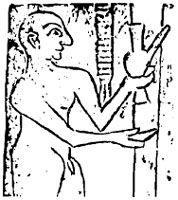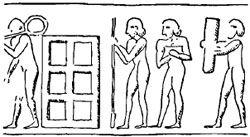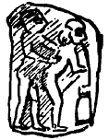The 12th Planet (58 page)
Authors: Zecharia Sitchin
Tags: #Non-Fiction, #Gnostic Dementia, #Fringe Science, #Retail, #Archaeology, #Ancient Aliens, #History

Black-headed Ones they were requesting of him.
To the Black-headed people,
they give the pickax to hold.
The Book of Genesis likewise conveys the information that "the Adam" was created somewhere west of Mesopotamia, then brought over eastward to Mesopotamia to work in the Garden of Eden:
And the Deity Yahweh
Planted an orchard in Eden, in the east ...
And He took the Adam
And placed him in the Garden of Eden
To work it and to keep it.
13
•
THE END OF ALL FLESH
Man's lingering belief that there was some Golden Age in his prehistory cannot possibly be based on human recollection, for the event took place too long ago and Man was too primitive to record any concrete information for future generations. If Mankind somehow retains a subconscious sense that in those earliest days Man lived through an era of tranquillity and felicity, it is simply because Man knew no better. It is also because the tales of that era were first told Mankind, not by earlier men, but by the Nefilim themselves.
The only complete account of the events that befell Man following his transportation to the Abode of the Gods in Mesopotamia is the biblical tale of Adam and Eve in the Garden of Eden:
And the Deity Yahweh planted an orchard
In Eden, in the east;
And he placed there the Adam
Whom He had created.
And the Deity Yahweh
Caused to grow from the ground
very tree that is pleasant to the sight
And good for eating;
And the Tree of Life was in the orchard
And the Tree of Knowing good and evil....
And the Deity Yahweh took the Adam
And placed him in the Garden of Eden
To work it and to keep it.
And the Deity Yahweh
Commanded the Adam, saying:
"Of every tree of the orchard eat you shall;
but of the Tree of Knowing good and evil
thou shalt not eat of it;
for on the day that thou eatest thereof
thou shalt surely die."
Though two vital fruits were available, the Earthlings were prohibited from reaching only for the fruit of the Tree of Knowing. The Deity—at that point—appeared unconcerned that Man might try to reach for the Fruit of Life. Yet Man could not adhere even to that single prohibition, and tragedy followed.
The idyllic picture soon gave way to dramatic developments, which biblical scholars and theologians call the Fall of Man. It is a tale of unheeded divine commandments, divine lies, a wily (but truth-telling) Serpent, punishment, and exile.
Appearing from nowhere, the Serpent challenged God's solemn warnings:
And the Serpent ... said unto the woman:
"Hath the Deity indeed said
'Ye shall not eat of any tree of the orchard'?"
And the woman said unto the Serpent:
"Of the fruits of the trees of the orchard
eat we may;
it is of the fruit of the tree in the
midst of the orchard that the Deity hath said:
'Ye shall not eat of it, neither touch it,
lest ye die.' "
And the Serpent said unto the woman:
"Nay, ye will surely not die;
It is that the Deity doth know
that on the day ye eat thereof
your eyes will be opened
and ye will be as the Deity—
knowing good and evil."
And the woman saw that the tree was good to eat
And that it was lustful to behold;
And the tree was desirable to make one wise;
And she took of its fruit and did eat,
And gave also to her mate with her, and he ate.
And the eyes of both of them were opened,
And they knew that they were naked;
And they sewed fig leaves together,
And made themselves loincloths.
Reading and rereading the concise yet precise tale, one cannot help wondering what the whole confrontation was about. Prohibited under threat of death from even touching the Fruit of Knowing, the two Earthlings were persuaded to go ahead and eat the stuff, which would make them "knowing" as the Deity. Yet all that happened was a sudden awareness that they were naked.
The state of nakedness was indeed a major aspect of the whole incident. The biblical tale of Adam and Eve in the Garden of Eden opens with the statement: "And the both of them were naked, the Adam and his mate, and they were not ashamed." They were, we are to understand, at some lesser stage of human development than that of fully developed humans: Not only were they naked, they were unaware of the implications of such nakedness.
Further examination of the biblical tale suggests that its theme is Man's acquisition of some sexual prowess. The "knowing" that was held back from Man was not some scientific information but something connected with the male and female sex; for no sooner had Man and his mate acquired the "knowing" than "they knew that they were naked" and covered their sex organs.
The continuing biblical narrative confirms the connection between nakedness and the lack of knowing, for it took the Deity no time at all to put the two together:
And they heard the sound of the Deity Yahweh
Walking in the orchard in the day's breeze,
And the Adam and his mate hid
From the Deity Yahweh amongst the orchard's trees.
And the Deity Yahweh called to the Adam
And said: "Where art thou?"
And he answered:
"Thy sound I heard in the orchard
and I was afraid, for I am naked;
and I hid."
And He said:
"Who told thee that thou art naked?
Hast thou eaten of the tree,
whereof I commanded thee not to eat?"
Admitting the truth, the Primitive Worker blamed his female mate, who, in turn, blamed the Serpent. Greatly angered, the Deity put curses on the Serpent and the two Earthlings. Then—surprisingly—"the Deity Yahweh made for Adam and his wife garments of skins, and clothed them."
One cannot seriously assume that the purpose of the whole incident—which led to the expulsion of the Earthlings from the Garden of Eden—was a dramatic way to explain how Man came to wear clothes. The wearing of clothes was merely an outward manifestation of the new "knowing." The acquisition of such "knowing," and the Deity's attempts to deprive Man of it, are the central themes of the events.
While no Mesopotamian counterpart of the biblical tale has yet been found, there can be little doubt that the tale—like all the biblical material concerning Creation and Man's prehistory—was of Sumerian origin. We have the locale: the Abode of the Gods in Mesopotamia. We have the telltale play on words in Eve's name ("she of life," "she of rib"). And we have two vital trees, the Tree of Knowing and the Tree of Life, as in Anu's abode.
Even the words of the Deity reflect a Sumerian origin, for the sole Hebrew Deity has again lapsed into the plural, addressing divine colleagues who were featured not in the Bible but in Sumerian texts:
Then did the Deity Yahweh say:
"Behold, the Adam has become as one of us,
to know good and evil.
And now might he not put forth his hand
And partake also of the Tree of Life,
and eat, and live forever?"
And the Deity Yahweh expelled the Adam
from the orchard of Eden.
As many early Sumerian depictions show, there had been a time when Man, as a Primitive Worker, served his gods stark naked. He was naked whether he served the gods their food and drink, or toiled in the fields or on construction jobs. (Figs. 154, 155)

Fig. 154

Fig. 155
The clear implication is that the status of Man vis-à.-vis the gods was not much different from that of domesticated animals. The gods had merely upgraded an existing animal to suit their needs. Did the lack of "knowing," then, mean that, naked as an animal, the newly fashioned being also engaged in sex as, or with, the animals? Some early depictions indicate that this was indeed the case. (Fig. 156)

